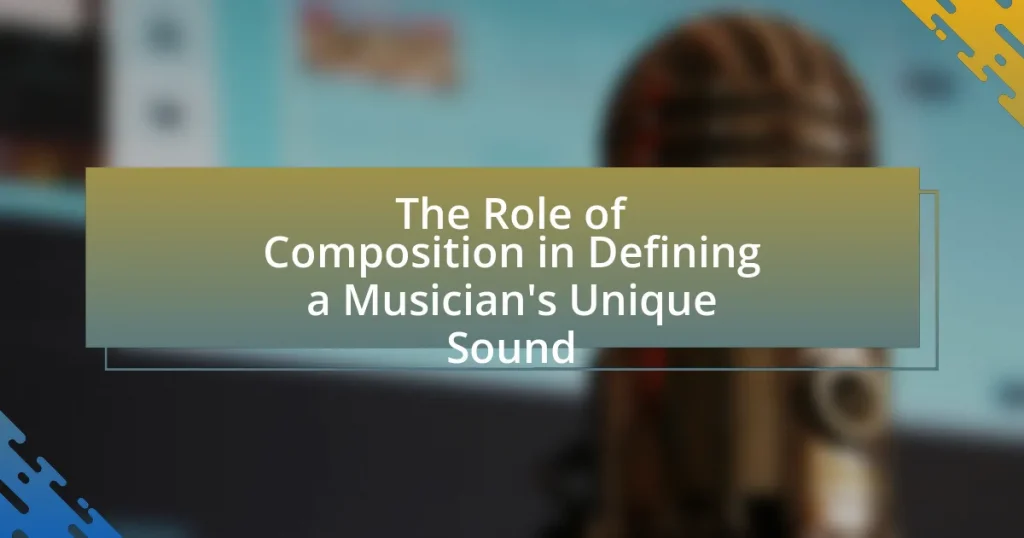The article examines the critical role of composition in defining a musician’s unique sound, highlighting how elements such as melody, harmony, rhythm, and instrumentation contribute to a distinct auditory identity. It explores how composition influences a musician’s identity and emotional expression, as well as the impact of different genres on compositional choices. Additionally, the article addresses the challenges musicians face in composition, strategies to overcome creative blocks, and resources available for enhancing compositional skills. Through analysis of personal experiences and collaboration, the article emphasizes the importance of experimentation in developing a unique musical voice.
What is the Role of Composition in Defining a Musician’s Unique Sound?
Composition plays a crucial role in defining a musician’s unique sound by determining the structure, harmony, melody, and rhythm of their music. These elements combine to create a distinctive auditory identity that sets the musician apart from others. For example, renowned composers like Ludwig van Beethoven and contemporary artists such as Billie Eilish utilize specific compositional techniques—like unconventional chord progressions and innovative song structures—to establish their signature styles. This uniqueness is further evidenced by the fact that listeners can often identify a musician’s work based solely on their compositional choices, highlighting the direct correlation between composition and a musician’s sound identity.
How does composition influence a musician’s identity?
Composition significantly influences a musician’s identity by shaping their artistic voice and personal expression. Through the process of creating original music, musicians convey their unique experiences, emotions, and cultural backgrounds, which become integral to their identity. For instance, a study published in the Journal of Music Theory by authors such as Allen Forte highlights how compositional choices reflect individual style and influence public perception. This connection between composition and identity is evident in genres like jazz, where improvisation and personal interpretation play crucial roles in defining a musician’s signature sound.
What elements of composition contribute to a unique sound?
Elements of composition that contribute to a unique sound include melody, harmony, rhythm, instrumentation, and arrangement. Melody shapes the emotional core of a piece, while harmony provides depth and context, influencing how the melody is perceived. Rhythm establishes the pace and feel, creating a foundation for the overall groove. Instrumentation determines the timbre and texture, as different instruments bring distinct qualities to the sound. Arrangement involves the organization of these elements, affecting dynamics and structure, which can lead to innovative and recognizable musical identities. These components work together to create a distinctive auditory experience that sets a musician apart.
How do different genres affect compositional choices?
Different genres significantly influence compositional choices by dictating the structure, instrumentation, and stylistic elements used in music creation. For instance, classical music often emphasizes complex harmonies and orchestration, while pop music typically favors catchy melodies and repetitive structures. The genre also determines the use of specific instruments; for example, jazz compositions frequently incorporate improvisation and brass instruments, whereas electronic music relies heavily on synthesizers and digital production techniques. These genre-specific characteristics shape how musicians approach their compositions, ultimately contributing to their unique sound.
Why is composition essential for musical expression?
Composition is essential for musical expression because it serves as the framework through which emotions, ideas, and narratives are conveyed in music. By structuring melodies, harmonies, and rhythms, composers create a unique sonic identity that reflects their artistic vision. Historical examples, such as Beethoven’s symphonies, illustrate how composition allows for the exploration of complex emotional landscapes, enabling listeners to connect deeply with the music. Furthermore, the act of composition involves decision-making regarding instrumentation and dynamics, which further enhances the expressive quality of a piece. Thus, composition is not merely a technical skill; it is a vital component that shapes the emotional and intellectual experience of music.
How does composition shape emotional responses in music?
Composition shapes emotional responses in music by utilizing elements such as melody, harmony, rhythm, and dynamics to evoke specific feelings. For instance, minor keys often create a sense of sadness or introspection, while major keys typically convey happiness or brightness. Research by the University of California, Berkeley, indicates that certain chord progressions can trigger emotional reactions due to their cultural associations and psychological impact. Additionally, the tempo and rhythm can influence the listener’s mood; faster tempos may induce excitement, while slower tempos can promote relaxation. These compositional techniques are essential in defining a musician’s unique sound and emotional expression.
What techniques do musicians use to convey their message through composition?
Musicians use various techniques such as melody, harmony, rhythm, dynamics, and instrumentation to convey their message through composition. Melody serves as the primary vehicle for expressing emotions and themes, while harmony adds depth and context to the melodic line. Rhythm establishes the pace and energy of the piece, influencing how the message is perceived. Dynamics, which involve variations in loudness, help to emphasize particular sections or emotions within the composition. Instrumentation allows musicians to choose specific sounds that align with their intended message, creating a unique auditory experience. For example, the use of strings can evoke a sense of nostalgia, while percussion can generate excitement. These techniques collectively enable musicians to articulate their artistic vision and connect with their audience effectively.

How do musicians develop their compositional style?
Musicians develop their compositional style through a combination of personal experiences, influences from other artists, and experimentation with different musical techniques. Personal experiences shape their emotional expression, while influences from genres, cultures, and notable musicians provide a framework for their creative exploration. For instance, many musicians study the works of their predecessors, which informs their understanding of structure, harmony, and melody. Additionally, experimentation with various instruments, software, and compositional methods allows musicians to discover unique sounds and techniques that resonate with their artistic vision. This iterative process of learning, practicing, and refining leads to the establishment of a distinctive compositional style that reflects their individuality and artistic intent.
What factors influence a musician’s compositional style?
A musician’s compositional style is influenced by various factors including cultural background, personal experiences, and musical training. Cultural background shapes a musician’s exposure to different musical traditions and genres, which can inform their unique sound. Personal experiences, such as life events and emotional states, often inspire the themes and emotions conveyed in their compositions. Additionally, musical training, whether formal or informal, provides the technical skills and theoretical knowledge necessary for composition, allowing musicians to express their creativity effectively. These factors collectively contribute to the distinctiveness of a musician’s compositional style.
How do personal experiences shape a musician’s sound?
Personal experiences significantly shape a musician’s sound by influencing their emotional expression, thematic choices, and stylistic preferences. For instance, a musician who has faced hardship may incorporate themes of struggle and resilience into their lyrics, resulting in a sound that resonates with authenticity and depth. Additionally, exposure to diverse cultures and musical genres during formative years can lead to a unique blend of styles, as seen in artists like Shakira, who fuses Latin and pop influences, reflecting her Colombian heritage and personal journey. Studies show that musicians often draw from their life events to create relatable and impactful music, reinforcing the connection between personal narrative and artistic output.
What role does collaboration play in developing a unique sound?
Collaboration plays a crucial role in developing a unique sound by allowing musicians to blend diverse influences and techniques. When artists work together, they share their individual styles, which can lead to innovative combinations that enhance creativity. For instance, the collaboration between David Bowie and Brian Eno in the late 1970s resulted in the “Berlin Trilogy,” a series of albums that showcased a distinct sound by merging rock with electronic music elements. This partnership exemplifies how collaboration can push boundaries and create something original that neither artist could achieve alone.
How does practice affect a musician’s composition skills?
Practice significantly enhances a musician’s composition skills by fostering technical proficiency and creative exploration. Regular practice allows musicians to develop their instrumental techniques, which directly influences their ability to express complex ideas in their compositions. For instance, a study by Ericsson et al. (1993) highlights that deliberate practice leads to improved performance and creativity, as musicians become more adept at manipulating musical elements such as melody, harmony, and rhythm. This increased skill set enables composers to experiment with diverse styles and structures, ultimately contributing to a more distinctive and personal sound.
What are effective methods for improving compositional techniques?
Effective methods for improving compositional techniques include regular practice, studying music theory, and analyzing existing works. Regular practice allows musicians to experiment with different styles and structures, enhancing their creativity and technical skills. Studying music theory provides a foundational understanding of harmony, melody, and rhythm, which are essential for effective composition. Analyzing existing works helps composers understand various techniques and approaches used by established musicians, enabling them to incorporate successful elements into their own compositions. These methods collectively foster a deeper understanding of composition and contribute to the development of a unique musical voice.
How can musicians find their voice through experimentation?
Musicians can find their voice through experimentation by actively exploring diverse musical styles, techniques, and instruments. This process allows them to discover unique sounds and expressions that resonate with their personal identity. For instance, artists like David Bowie and Prince are known for their willingness to experiment across genres, which contributed significantly to their distinctive musical voices. Research indicates that experimentation fosters creativity, as it encourages musicians to break away from conventional norms and embrace innovative approaches, ultimately leading to a more authentic artistic expression.

What are the common challenges musicians face in composition?
Musicians commonly face challenges in composition such as writer’s block, lack of inspiration, and difficulty in translating emotions into music. Writer’s block can hinder creativity, making it hard for musicians to produce new material. Lack of inspiration often arises from external pressures or personal circumstances, which can stifle the creative process. Additionally, translating complex emotions into musical elements requires skill and experience, and many musicians struggle to effectively convey their feelings through their compositions. These challenges are well-documented in studies on creativity in music, highlighting the psychological and emotional barriers that can impede a musician’s ability to compose effectively.
How do creative blocks impact a musician’s ability to compose?
Creative blocks significantly hinder a musician’s ability to compose by obstructing the flow of ideas and inspiration necessary for songwriting. When musicians experience these blocks, they often struggle to generate new melodies, lyrics, or arrangements, leading to frustration and decreased productivity. Research indicates that approximately 70% of musicians report encountering creative blocks at some point, which can result in prolonged periods of inactivity and a diminished sense of artistic identity. This disruption not only affects the quantity of output but can also compromise the quality of the music, as the emotional connection and spontaneity that typically characterize a musician’s unique sound may be lost during these challenging times.
What strategies can musicians use to overcome creative blocks?
Musicians can overcome creative blocks by employing strategies such as setting a routine, experimenting with new instruments, and collaborating with others. Establishing a consistent schedule for practice and composition can help create a productive environment, as research indicates that regular engagement fosters creativity. Experimenting with different instruments or genres can stimulate new ideas and perspectives, which is supported by studies showing that exposure to diverse musical styles enhances creative thinking. Additionally, collaboration with other musicians can provide fresh insights and inspiration, as social interaction has been proven to boost creative output.
How can feedback from others influence a musician’s composition process?
Feedback from others can significantly influence a musician’s composition process by providing new perspectives and constructive criticism that enhance creativity and refine musical ideas. When musicians receive input from peers, producers, or audiences, they can identify strengths and weaknesses in their compositions, leading to improvements in melody, harmony, and structure. For instance, studies have shown that collaborative environments often yield more innovative outcomes, as musicians can build on each other’s ideas, resulting in a richer final product. This dynamic interaction not only fosters artistic growth but also helps musicians develop a sound that resonates more effectively with listeners, ultimately shaping their unique musical identity.
What resources are available for musicians to enhance their composition skills?
Musicians can enhance their composition skills through various resources, including online courses, books, software, and workshops. Online platforms like Coursera and MasterClass offer courses taught by renowned composers, providing structured learning and practical exercises. Books such as “The Complete Idiot’s Guide to Music Composition” by Michael Miller and “Composing Music: A New Approach” by David Stevenson offer foundational knowledge and techniques. Music composition software like Sibelius and Finale allows musicians to experiment with their compositions digitally, facilitating creativity and organization. Additionally, attending workshops and masterclasses can provide hands-on experience and direct feedback from experienced composers, further enhancing a musician’s skills.
Which books and courses are recommended for aspiring composers?
Aspiring composers are recommended to study “The Complete Idiot’s Guide to Music Composition” by Michael Miller and “Composing Music: A New Approach” by David Stevenson. Additionally, online courses such as Berklee College of Music’s “Music Composition” and Coursera’s “Songwriting for Beginners” provide structured learning paths. These resources cover essential techniques and concepts in music composition, helping composers develop their unique sound.
How can technology assist in the composition process?
Technology can assist in the composition process by providing tools that enhance creativity and streamline workflow. Digital audio workstations (DAWs) allow musicians to record, edit, and arrange music efficiently, facilitating experimentation with different sounds and arrangements. Additionally, software instruments and plugins offer a vast array of sounds and effects, enabling composers to explore diverse musical styles without the need for physical instruments. Research indicates that the use of technology in music composition can lead to increased productivity and innovation, as evidenced by a study published in the Journal of New Music Research, which found that composers using DAWs reported higher levels of creative output compared to traditional methods.
What practical tips can musicians apply to define their unique sound through composition?
Musicians can define their unique sound through composition by experimenting with diverse musical scales and structures. By incorporating unconventional scales, such as the whole tone or pentatonic scales, musicians can create distinctive melodies that set them apart. Additionally, utilizing varied time signatures and rhythmic patterns can enhance originality, as seen in genres like progressive rock, where complex rhythms contribute to a unique sound.
Moreover, musicians should focus on their personal experiences and emotions when composing, as authenticity often resonates with listeners. For instance, artists like Taylor Swift have successfully drawn from personal narratives to craft songs that reflect their individuality.
Lastly, collaboration with other musicians can introduce new ideas and perspectives, further enriching a musician’s sound. Collaborations often lead to innovative compositions, as evidenced by the success of projects like the supergroup Them Crooked Vultures, which combined the distinct styles of its members.















